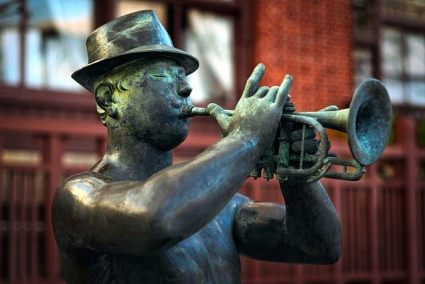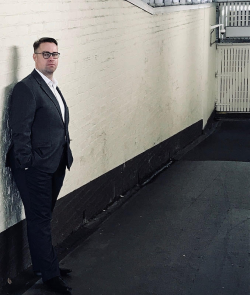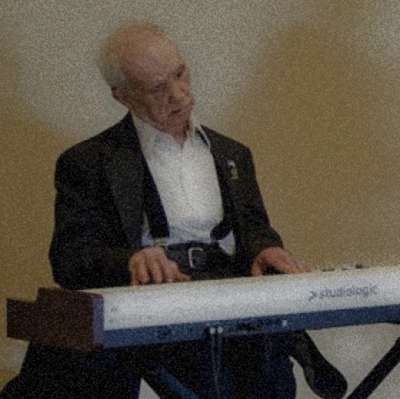.
.
“Drop It and Go,” a story by Chris Simpson, was a short-listed entry in our recently concluded 56th Short Fiction Contest. It is published with the permission of the author.
.
.

.
Drop It and Go
by Chris Simpson
.
Mike finished washing his face just as he knew Tomas, his son, would start the journey over to visit him. He wasn’t home yet, that place he called “home.” East to his son’s West.
…..Walking in the sun, Mike went to his car. Placing Ruben Wilson into the player, Mike started the car and drove out of IKEA’s staff car park. If there was no traffic, there would be just enough time to change when he got home. There was traffic.
…..While waiting, Mike could feel the sweat under his arms from a ten-hour shift. As the R rate went up, the rate of people dying went up, but folks needed furniture more than ever.
…..From the centre console, he took his pouch of tobacco and rolled a fag. Taking in the smoke, Mike kept his committal to quit from roll-up -to- roll-up using a mantra which was full of temptation: I have quit. Simply because he woke in the morning and smoked, never went to sleep before another, and the ubiquitous several throughout the day, it didn’t mean his commitment wasn’t strong in those moments in between.
…..The pace out of the slip road to the motorway was glacial. Tortoises in congress moved faster. Anxious, Mike took out the Ruben Wilson CD and placed in Dexter Gordon. Being the afternoon, it was early-Dexter. Another roll-up in his mouth and the wish for a proper cigarette hit him. When Tomas was born, Mike smoked proper cigarettes. He also drank proper scotch, ate steaks whenever he felt like it and wore suits. He was a man to be reckoned with in the way a good piece of art stands out: on its own terms, drawing you in.
…..Today, alongside the inferior roll-ups, his clothes were either his uniform or baggy jeans and a check shirt. Steaks, if eaten at all, were purchased when reduced. As for the drink – long given up. Those late nights with late-Dexter would be to the accompaniment of herbal tea. Regular tea kept him awake. When he gave things up, when he gave that old life up, the things he took on had to be impartial.
…..One roll-up finished, another one rolled, his third before he’d even made it to his turning. The pace was a bit better, but you could still make out your fellow driver clearly. Early-Dexter was too much for him then, so Mike changed again and slipped in Alice Coltrane. With the music sounding like a dream just woken up from, Mike wished Tomas wouldn’t come over on Wednesdays. It was one day a week and often it felt like one day a week too much. At the ache, his phone rang.
…..Mike turned the music off, coughed, then flipped his phone open. “Hey, Tom-Tom. You’re not at mine already are you?”
…..“Hey, dad. Traffic is terrible. Why’s everyone out?”
…..“Can’t say I’m surprised. The world continues to flow.”
…..“You still want me to come over?”
…..“Sure,” Mike said, remembering how easy it is to lie. “You don’t want to?”
…..“I’ve got a virtual gig at eight, so I won’t stay long.”
…..“Any time at all is good.”
…..When the music came back on, Mike shook his head.
.
He pulled up to see Tomas by the wall, good shoes, black trousers, a royal blue paisley shirt and a matching bandana covering his throat. The boy was as sharp as a box cutter. Mike got out of the car, feeling old at the sight of his child. He ground out a roll-up.
…..“They’ll kill you, dad.”
…..“Don’t you vape?” Mike shut the driver’s door and walked forward.
…..“A bit of water and chemicals ain’t going to hurt.”
…..“You above that, huh?”
…..“I’m above most.”
.
Up in Mike’s room, Mike made a cup of coffee for Tomas. He kept the good coffee, bought from an Ethiopian wholesaler, in a small fridge. His son’s cup, emblazoned with a Keith Haring artwork for the ’83 Montreux Jazz Festival, sat above it. To the side of the cup, the ceramic coffee press. It was neat and ordered, a gift from father to son to show that orderliness and neatness, were now prized.
…..In the mornings, Mike was good with instant.
…..Tomas took his first sip. “This is damn good.”
…..“Enjoy it while you’re young,” Mike said, and opened a window to smoke his roll-up.
…..“It must hurt to not need this fuel no more?”
…..“Only hurts if I think about it.”
…..“But you get to live through me,” Tomas said, taking another sip.
…..Mike laughed. “Son, I ain’t that old. I’ve got some living yet to do.”
…..“Yeah?”
…..“Absolutely.” Mike flicked ash out of the window.
…..“You can’t smoke in these rooms, can you?”
…..“I pay my rent on time. That’s all Anthony cares about. All the signs that this room came with, all the signs obscured by posters, they’re for the tourists. I’m here for an age and a bit.”
…..Mike wanted it to sound easy, to sound as if he didn’t care about living in a house share with four other men. The signs he saw when he first moved in, full of typos, full of demands that whoever rents the room must not bring in pets, or guests for more than one night a week, or use paraffin heaters in winter, nor fans in summer and, under no circumstances, must tenants smoke. But here he was, five years in, and with no plans to leave and no plans to look at those signs either. Miles Davis from Tutu, Billie Holiday from Lady in Satin, Chet Baker from No Problem covered up those signs. Yep, Davis with his swan song, Holiday with a full liver, Baker toothless and back on junk – this was what Mike saw when he furnished his room in an illusion to make himself permanent in a rented room.
…..“How’re things going with Hayley?”
…..“Good. You know, for two people stuck in a flat.”
…..“I was wondering why you were still coming here. Need to get away from the setup?”
…..“Nah. I enjoy the setup. It makes up for being out so much last year. Who knew I needed a pandemic to slow down?”
…..Mike reached a foot forward to touch Tomas’ trumpet case. “Bet the neighbours love you too?”
…..“I’ve got the world’s smallest studio, insulated cheaply, kitted out for one. No complaints so far.”
…..Tomas drank again. As Mike sat in his small armchair, he didn’t know what else to talk about. Looking away from his son, his eyes went to the postcard above the small mirror on the back of the room’s door. From Mia, Tomas’ mother, a picture of a small coastal town in Germany – her motherland which she had moved back to. The postcard wished him well from her and her husband, her second husband, Karl.
…..Tomas followed his dad’s eyes. “Mum’s doing well.”
…..“Yeah, she said.”
…..“Well, that postcard’s been there a while.”
…..“Two months isn’t long.”
…..Tomas shrugged.
…..Mike touched his foot to the case again. “You’ve got to stop bringing that.”
…..“Betsy always needs a walk.”
…..“Nah, that’s not why you bring her.”
…..“No?”
…..“No,” Mike said, already making himself another roll-up. “I won’t be playing anytime soon.”
…..Tomas nodded. “Okay. But, that’s not why I bring her.”
…..Mike licked his paper.
.
Soon, Tomas had finished his coffee. The two men remained sitting in Mike’s room not saying anything but listening to the sounds from outside; the lucky furloughed few out for a walk, the unlucky lot who went to work returning home, and nature herself busy away in a world which hadn’t, bar the clean rivers in faraway Venice, changed much.
…..At eight o’clock, Mike gingerly tapped away at the tablet Tomas had bought him for Christmas. He entered the passcode and waited for the virtual gig to begin. In the top right-hand corner of the screen was Tomas, trumpet in front of him like a brass shield. The band leader was in the top left-hand, saxophone by his hip, a smile on his face which wouldn’t have looked out of place on one of the managers Mike worked for. He could see this leader giving orders, passing the scanner Mike’s way, using his face mask to warm his chin, thinking Mike was out of place, out of time, out of another era which had to be wiped clean. Mike noticed that he was still wearing his work’s yellow polo shirt; a gutted life vest, resting on a seemingly calm sea. The music started.
…..Tomas looked settled when he played and relaxed when he wasn’t. Playing music, listening to his fellow musicians play, this was when he was at his best while in front of an audience, even an audience he couldn’t see. Mike remembered he’d never been like that when he played. Even if he were in a small virtual box, in the top corner of a screen, an audience invisible, far away and unknown in the internet air, it wouldn’t have helped. Only one thing helped until it didn’t, and then there was no more of that.
.
By ten, the gig had finished. Mike texted Tomas: You made Betsy rejoice. Good work x. He then made another roll-up and listened to some late-Dexter.
…..Out on the street, an occasional boy racer drove past, screeching off into the night, their car levitating for a moment before coming back to earth. The sound cracked through Mike’s head. He thought of the young families in the street, their children waking. Or maybe their children got used to it. Maybe their parents stayed around for many reasons, not only to feed and clothe but to do something as fundamental as soothe their child back to sleep, back to the world which cannot touch them, cannot touch them as they lay at their most vulnerable.
…..After he heard the toilet flush and the bathroom door slam, Mike got up, took his wash bag with him, washed and brushed his teeth, and then returned to his room. He’d never thought he’d get used to waking up early, but he did. He’d never thought he’d get used to sleeping less and less as the years went by, but he did. He’d never thought he’d get over being the man who walked out of his family, but he did. No, it’s not that, he thought. I’ve had to change.
…..In bed, Mike listened to the near silence, to the sounds of a house that wasn’t his, to the street which held possibilities he no longer had, to the refrain of Tomas’ last notes before the gig ended. The taste in his mouth was back again: the taste of a good suit picked, the taste of a fine steak, the peat of an old whisky.
…..Yes, he’d had to change.
.
___
.

Chris Simpson grew up in Bracknell and Slough. He has worked as a waiter, a cinema projectionist, a shoe salesman, an attendant in an amusement arcade, hiring out construction and demolition tools, a pasty seller, a caretaker for a primary school, a teaching assistant and a tutor. He was a collaborator on a sketch show and has performed as a stand-up comedian.
This year he will be published alongside Kit De Waal, Kerry Hudson, Paul McVeigh, Philip Ridley and other established and emerging writers in MainStream from Inkandescent Publishers. He has received a special mention for the Spread The Word 2020 Life Writing Prize, and in 2019 he was nominated for the inaugural Agora and PFD Lost The Plot Prize. He has also been an awardee of the inaugural Spread The Word’s London Writers Award, as well as receiving a First in Creative Writing at BA level from Birkbeck University.
He lives in London and is seeking publication for his first novel, The Infinite Ache, and his short story collection, Part-Time Happiness.
Click here to visit his website
.
.
Listen to the 1947 recording of Dexter Gordon playing “I Can’t Escape From You”
.
.
.







































